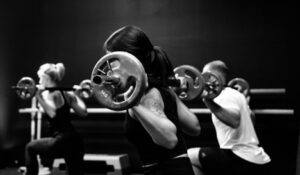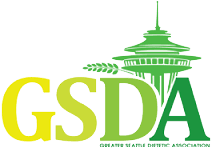Fueling for Power Sports
Fueling for Power Sports
Anna Hall is a dietetic intern at Bastyr University

Power sports demand a high level of strength and endurance. Athletes need to be intentional about their diets. Including the right foods in your diet can help improve your performance and your overall well-being.
Power sports require strength, speed, and endurance. If you participate in power sports, you have increased dietary needs to fuel yourself for your sport. Consuming enough carbohydrates and protein is the key to success. Having balanced meals and healthy snacks can improve your performance and health.
What are power sports?
Power sports refer to strength-based sports and recreational activities that require explosive movements, physical strength, speed, and endurance. Power sports can be competitive or non-competitive. Examples of power sports include weightlifting, CrossFit, sprinting, wrestling, football, shot put, volleyball, and Orange Theory. People who participate in power sports will need more calorie and nutrient needs due to the physical demands of exercise.
Why do power sports athletes have different dietary needs?
Power sport athletes need to eat a diet that fuels their body to improve performance, prevent injury, and support well-being. You need to eat enough to support muscle growth and repair and have enough energy. A proper diet can help you recover faster, have a better immune system, prevent injury, support focus, and improve overall health.
What kind of diet does a power sports athlete need to eat?
You should have a diet rich in grains, protein, and other nutrients. Due to increased nutrient needs, it is important to put more thought into the makeup of your meals. The general outline of an athlete’s plate should consist of:
- ½ of the plate fruits and vegetables
- ¼ of the plate lean protein
- ¼ of the plate whole grains
Besides having a healthy plate at mealtimes, snacks are also a great way to help reach your nutrient goals. Snacks with grains and protein supply great fuel, some examples include:
- Brown rice cakes with nut butter
- Low-fat string cheese, whole grain crackers, and an apple
- Protein bar and a banana
- Banana and peanut butter on whole-grain bread
- Whole grain crackers and hummus
Why do athletes need these food groups?
Each food group plays an important role in fueling an athlete. Grains are full of carbohydrates which provide you energy. Protein is needed for building muscle. Fruits and vegetables have vitamins, minerals, and fiber to support your bodily functions. The food groups work together to give you the best fuel for your sport.
Participating in power sports increases dietary needs. You need to fuel your body for improved performance, recovery, and overall health. Having a balanced plate and healthy snacks can help you fuel better for your sport. If you would like to learn more on how to better fuel your body visit the Bastyr Center for Natural Health. Schedule an appointment at https://bastyrclinics.org/seattle#no-back or call (206)-834-4100.
Anna Hall is a dietetic intern at Bastyr University in Seattle, WA. Her clinical interest surrounds working in sports nutrition. She enjoys running, weightlifting, and anything outside.
References
- American College of Sports Medicine. Nutrition and athletic performance. Medicine & Science in Sports & Exercise. 2016;48(3):543-568. doi:https://doi.org/10.1249/mss.0000000000000852
- Spriet LL. Performance Nutrition for Athletes. Sports Medicine. 2019;49(S1):1-2. doi:https://doi.org/10.1007/s40279-018-1027-9
